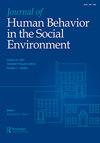韩国大学生青少年赌博预期调查(AGES)的验证:一项试点研究
IF 1.2
Q3 SOCIAL WORK
Journal of Human Behavior in the Social Environment
Pub Date : 2023-11-12
DOI:10.1080/10911359.2023.2278524
引用次数: 0
摘要
【摘要】目的虽然多项研究发现青少年赌博期望调查(AGES)在高中生和大学生中是有效和可靠的,但AGES在韩国大学生中的适用性尚不清楚。本研究的目的是检验Wickwire等人(2010)开发的青少年赌博预期调查(AGES)的有效性。方法以481名韩国在校大学生为研究对象,采用在线调查的方式收集数据。为了检验韩国版年龄量表(K-AGES)的结构效度和内部一致性,我们进行了项目分析和验证性因子分析。结果项目分析结果确定了22个项目,包含5个因素:物质利益、消极影响、积极自我评价、消极社会后果和父母不赞成。此外,验证性因子分析结果表明,这22个项目与数据拟合良好。结论K- AGES量表具有较强的心理测量学特征,具有良好的结构效度和信度,可作为评估、预防和治疗大学生赌博问题的有效工具。关键词:青少年赌博期望调查;赌博期望;赌博行为;大学生赌博心理计量;本文章由计算机程序翻译,如有差异,请以英文原文为准。
Validation of the Adolescent Gambling Expectancies Survey (AGES) among Korean college students: A pilot study
ABSTRACTObjective Although several studies have found the Adolescent Gambling Expectancies Survey (AGES) valid and reliable for high school students and college students, the applicability of the AGES to Korean college students remains unknown. The objective of this study was to examine the validity of the Adolescent Gambling Expectancies Survey (AGES) developed by Wickwire et al. (2010).Methods The study sample consisted of 481 college students in Korea, and the data were collected through an online survey. To examine the construct validity and internal consistency of the Korean version of the AGES (K-AGES), an item analysis and a confirmatory factor analysis were conducted.Results The results of item analysis have identified 22 items with five factors: Material gain, negative affect, positive self-evaluation, negative social consequences, and parent disapproval. In addition, the results of confirmatory factor analysis show these 22 items fit the data well.Conclusions The K- AGES has strong psychometrics, including good construct validity and reliability, and, hence, it may be a useful tool for assessing, preventing, and treating gambling problems in college students.KEYWORDS: Adolescent gambling expectancies surveygambling expectancygambling behaviorgambling of college studentspsychometrics Disclosure statementNo potential conflict of interest was reported by the authors.
求助全文
通过发布文献求助,成功后即可免费获取论文全文。
去求助
来源期刊

Journal of Human Behavior in the Social Environment
SOCIAL WORK-
CiteScore
3.70
自引率
0.00%
发文量
61
期刊介绍:
The Journal of Human Behavior in the Social Environment helps social workers firmly grasp developing issues in human behavior theories. It provides an outlet for empirically based articles about human behavior theory that facilitate social workers" practice goals. This innovative journal is the first to address the complexities of human behavior in relation to social work and its relevancy to practice. This makes it an essential resource for classes in human behavior in the social environment. Articles provide you with groundbreaking, up-to-date information on developments in empirically based human behavior theory. They address conceptual and empirical foci which study human behavior as a complex phenomenon.
 求助内容:
求助内容: 应助结果提醒方式:
应助结果提醒方式:


